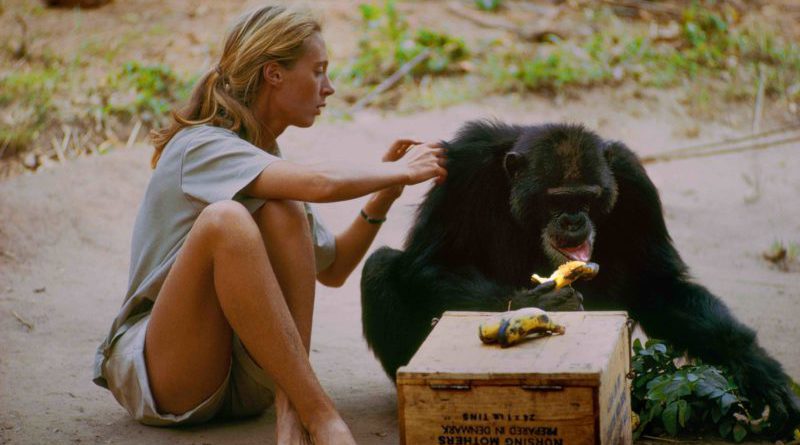REVIEW: ‘Jane’ revisits what makes Jane Goodall good to all
Photo: Gombe, Tanzania — David Greybeard was the first chimp to lose his fear of Jane Goodall, eventually coming to her camp to steal bananas and allowing Goodall to touch and groom him. As the film Jane depicts, Goodall and the other Gombe researchers later discontinued feeding and touching the wild chimps. The feature documentary Jane was released in select theaters in October 2017. Photo courtesy of National Geographic Creative/ Hugo van Lawick / Provided by National Geographic Pressroom with permission.
Jane, the new documentary from director Brett Morgen, tells the perpetually fascinating story of Jane Goodall, the British woman who traveled to Eastern Africa and was provided with an unbelievable opportunity to study chimpanzees in the wild. Her story is legendary, and she made several important discoveries in her years-long observations.
The new film, which will premiere on TV for the first time Monday, March 12 at 8 p.m. on National Geographic and Nat Geo WILD, focuses on this early research in the 1960s — research that would make Goodall a household name. However, the 90-minute documentary goes deeper, focusing on how the chimps influenced Goodall’s personal life, in addition to her professional ambitions.
Using archival footage from Goodall’s ex-husband, National Geographic photographer Hugo van Lawick, the movie begins with the spirit of energy and boundless hope that kickstarted Goodall’s career at Gombe, located in present-day Tanzania. She would head off alone into the hills and valleys, binocular dangling from her neck, looking for chimpanzees. Her dedicated efforts were met with some success, but she could never get close enough to view the animals for an extended period of time and document their movements and behaviors.
After a while, van Lawick was assigned to photograph Goodall’s efforts for National Geographic. At first, she felt like her solitude was broken up by this stranger and his lens, but the two learned to love each other.
Eventually, as Goodall’s studying continued, the chimps began to come closer to her camp. At one point, they would stop by and round up any spare bananas. This newfound intimacy led Goodall to be accepted among the animals, so much so that she was able to study them at close range, touch them and even be groomed by them on occasion. The access, even when viewed this many years later, was remarkable.
Goodall’s discoveries, which are detailed in her books and countless magazine articles, were profound. She saw the animals using broken leaves to dig for termites, and this was the first time anyone observed the primates using tools. She documented their family units, their mating, their mourning, their love, their warring.
Along the way, she gave the usual suspects some names, including David Greybeard, Flo, Flint and Goliath. Her research gave the world so much evidence of primate behavior, and she also retooled the concept of scientific research — no doubt earning some detractors.
Morgen’s film doesn’t shy away from the discrimination and doubting Goodall faced in the early years, especially among journalists who tried to describe the researcher’s efforts along the limited gender viewpoints of the day. She overcame these doubters and still stands today as a powerful female figure for girls, boys, women and men.
Jane takes its time with the actual science behind Goodall’d discoveries, and Morgen lets many of the images captured by van Lawick fill the screen and gain their emotional impact. The videography that accompanies Goodall’s voiceover in the documentary is startlingly beautiful and unique. Philip Glass’ evocative score also helps add feeling and verve to the archival footage.
Goodall’s family life is explored as well, including the strong relationship she had with her mother, her marriage to van Lawick and her own motherhood. Through journal entries, voiceover and a new interview, Morgen displays moments of strength, independence, heartbreak and success.
One thing remains clear: Throughout the many choices Goodall made in her life, the chimpanzees were always considered. She wanted to study these animals in the wild, and she was determined to achieve that goal.
Today, Goodall travels the world 300 days a year, bringing a message of hope to her fans and animal advocates, and raising awareness for the Jane Goodall Institute and her youth-education program, Roots & Shoots. She is no longer directly involved in the Gombe research, but the spark that she lit more than 50 years ago continues to burn brightly. The research of the chimps carries on, and, in fact, Goodall’s efforts have led to a redefining of human beings and their similarities to the different primates in the wild.
Jane teaches the world, once again, about the importance of Goodall on the global stage, the importance of Goodall as a scientist, the importance of Goodall as a strong female role model and the importance of Goodall to the chimpanzees and animals of the world.
By John Soltes / Publisher / John@HollywoodSoapbox.com
Jane (2017), directed by Brett Morgen, features Jane Goodall. The documentary will premiere on TV Monday, March 12 at 8 p.m. on National Geographic and Nat Geo WILD. Click here for more information. Rating: 




